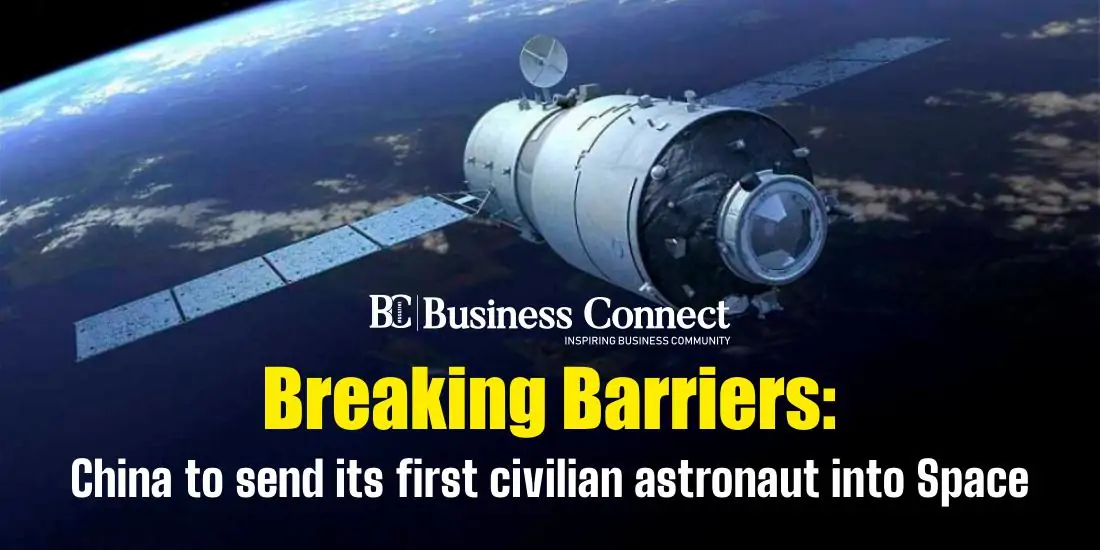Breaking Barriers: China to send its first civilian astronaut into Space
Written by Sanjay Kumar
According to officials, China is set to send its first civilian astronaut into space as part of a crewed mission to the Tiangong space station on Tuesday (May 30).
On Monday, the China Manned Space Agency announced that Gui Haichao, a payload expert and professor at Beijing University of Aeronautics and Astronautics, will take off from the Jiuquan Satellite Launch Center in northwest China at 9:31 am local time (01:31 GMT).
This marks a significant departure from previous missions, as until now, all Chinese astronauts sent into space have been members of the People’s Liberation Army. Gui will have a specific role in the mission. As the on-orbit operator of space science experimental payloads, he will be primarily responsible for their operation.
The mission’s commander will be Jing Haipeng, who is embarking on his fourth journey into space, according to state media. The third crew member is engineer Zhu Yangzhu. China has been investing billions of dollars into its military-run space program, aiming to catch up with the United States and Russia. Its ambitious plans include landing astronauts on the moon by 2030.
Last year, China completed the construction of its third and permanent space station, Tiangong. The final module of the station successfully docked with the core structure in November, forming a T-shaped configuration. The name Tiangong translates to “heavenly palace.”
Tiangong is equipped with cutting-edge scientific equipment, including the world’s first space-based cold atomic clock system, as reported by state news agency Xinhua. It is expected to remain in low Earth orbit, approximately 400 to 450 kilometers (250 to 280 miles) above the planet, for at least 10 years. This achievement fulfills China’s goal of establishing a long-term human presence in space.
The space station will be continuously manned by rotating teams of three astronauts. Their main tasks will involve conducting scientific experiments and testing new technologies.
While China does not plan to engage in global cooperation on the scale of the International Space Station, it has expressed openness to foreign collaboration. However, the extent of such cooperation has not been clarified.
China has been excluded from the International Space Station since 2011, when the United States imposed a ban on NASA’s collaboration with the country.
ISRO’s GSLV-F12 Achieves Success: NavIC Satellite NVS-01 Successfully Deployed into Orbit
On a related note, in the realm of space exploration, the Indian Space Research Organisation (ISRO) achieved a remarkable feat on Monday (May 29). They successfully placed NVS-01, the inaugural satellite of their second-generation series, into geosynchronous transfer orbit. This significant accomplishment was made possible through the fifteenth flight of the Geosynchronous Satellite Launch Vehicle (GSLV). NVS-01’s primary purpose is to ensure the continuity of navigational (NavIC) services while also introducing a novel service in the L1 band.
At precisely 10:42 am on Monday, the GSLV-F12 gracefully took off from the second launch pad at Satish Dhawan Space Centre, located within the Sriharikota High Altitude Range. Approximately 19 minutes after liftoff, the rocket flawlessly positioned the 2232kg satellite at an altitude of 251km. This remarkable achievement signifies a significant leap forward for India’s space program and its quest for technological advancements in the cosmos.
#WATCH | Indian Space Research Organisation (ISRO), launches its advanced navigation satellite GSLV-F12 and NVS-01 from Sriharikota.
(Video: ISRO) pic.twitter.com/2ylZ8giW8U
— ANI (@ANI) May 29, 2023
Must Read:-
- Top 10 shoe brands in India for men & women 2023
- Top 10 Adorable Gifts for Your Special One
- Top 10 Countries with Maximum Indian Population as Citizens
- Top 10 Small Business Statistics You Need to Know For 2023
- Top 10 highest paid CEO in the World
- Top 10 richest person of India
- Top 10 Highest Paid CEOs of India
- Top 10 Most Selling Bikes and Scooters of 2022 in India
- The Success Story of Jeff Bezos
- Success Story Of Elon Musk
- Top 10 Business Newspaper In India
- Top 10 Tourist Places in India, places to visit after lockdown


